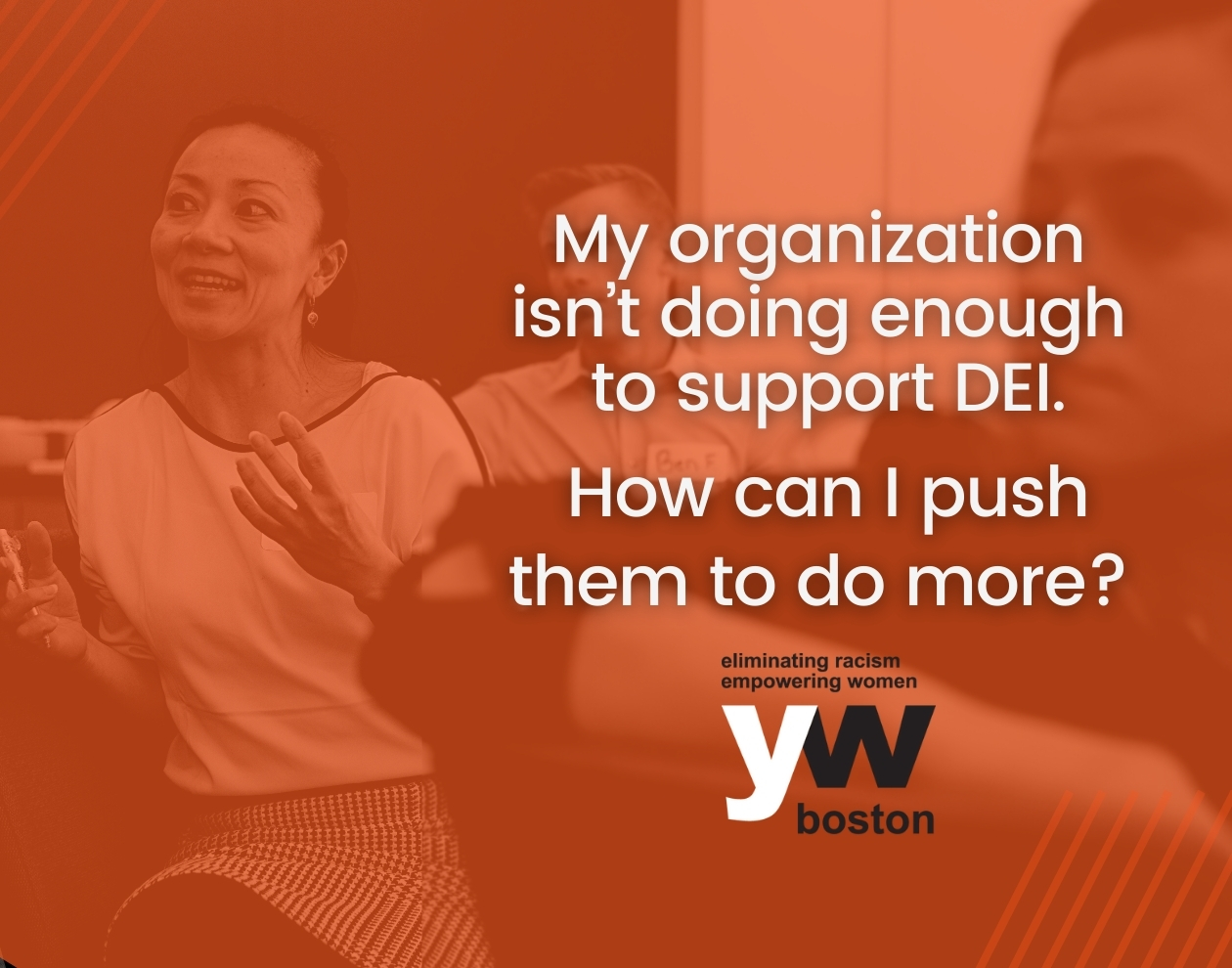
May 26, 2021
By: Jimmy Juste, YW Boston's Manager of InclusionBoston
My organization isn’t doing enough to support DEI. How can I push them to do more?
As YW Boston’s InclusionBoston Manager, I often receive an urgent question: How do I push my organization to do more diversity, equity, and inclusion work? How can I push them to do ‘the work’?
Before I answer this question, I would be remiss not to acknowledge my privileged position of writing this blog for the organization I work for, YW Boston. I do my part of the great work of liberation in Zoom rooms and meeting spaces, surrounded by dry erase markers and crumpled sticky pads. Others champion this work in the streets, with the people most vulnerable to the oppressive systems we all negotiate. The spaces I work to liberate, organizations, are far safer than the streets of Columbia or Palestine. This is where liberation is a framework or a concept to ruminate upon . On the ground, with the people is where liberation is a thoughtless but noble deed. Let me say that first, before anything at all.
So, you’re wondering how to push your organization into doing more of ‘the work,’ and becoming equitable and inclusive? Don’t. I might conjure a more thoughtful answer if you asked, “how do I encourage my organizations to prioritize equity and inclusion?” so let’s go from there.
Those of us working in offices, in cities like Boston, are not fighting for lives but negotiating livelihood and culture. To do the work means to seed new cultures and ways of being in organized social structures. The work can’t be pushed but intentioned, then built, then iterated upon, and built again. At the center of this are relationships and how they affect culture. If we default to treating one another as if our lives are at stake then we lose sight of the efficacy that is available to us and begin treating our colleagues like shadows in the night. So don’t push. Set clarified intent, be honest, and build.
The most important thing to reflect on before you make any moves is to determine whether your motivations are authentic. That means determining whether or not you are personally and professionally connected to progress, as compared to whether you think it is important that others see you perform your virtue. Ask: Why do I want this? Who am I concerned enough for that when they are challenged, I also feel challenged? Once you’ve gotten clear on whether or not your sense of urgency for ‘the work’ is authentic and you’ve figured out how its success could make your own experiences more valuable, it’s time to assess your environment.
Know the difference between opposition and an obstructive bystander.
When we feel a fire in our bellies, it is easy to mistake someone in your way for someone standing in opposition and it can take years to learn the distinction. Those who are in the way, an obstructive bystander, haven’t recognized how ‘’the work” is good for them too. They are more motivated to hold and protect their social/financial/professional position. And considering this is a priority for them at this juncture of their life, it totally makes sense. It will take time before they can authentically see themselves in the suffering of others and this can’t happen on anyone else’s timeline but their own. For these folks, teach them how not to stand in the way and lean heavily on the things you appreciate about them.
When they are ready, they will clumsily say a statement/question in the form of microaggression: “I mean is it really a problem, I have no idea. So-and-so has been working here for 4 years. I haven’t heard of any problem. So-and-so, have you had any problems working here?” And when they do, tell them the honest truth.
Sometimes the most obstructive voices can come from people who have marginalized identities and were resourceful and gifted enough to navigate a rigged system, taking it to mean that if it is possible to navigate systems successfully than there is no need to make them better. When they share this perspective, they are hoping to remind us to step into our agency and power, but what they obstruct is the opportunity to clarify our values and be better.
Those who oppose ‘the work’ maneuver more covertly and are efficient in their use of power to re-route resources, and before long will cause any DEI project to peter out. If you make the decision that you care about these folks enough to put the work in to help them ‘see’, be prepared to watch them fail and sabotage themselves a LOT. As far as they are concerned, you just don’t understand what they are trying to preserve and ‘the work’ of dismantling systems is the opposite of preservation. One might go far as to say they perceive themselves through the lens of the organization and dismantling its functions might dismantle how they see themselves. Maybe this sounds like conjecture, or psycho-babble but its the only thing that keeps me from ceasing to see their humanity and writing them off as a bigoted-monster. And they might be, but I have flexible hope that they’re not because I am not fighting for my life in the way others have to. We can all work to see opposition as a function for helping us identify what we will not tolerate, to teach others to recognize it, and to nurture the stamina to critically reflect on how it affects them.
The considerations for pushing.
Pushing can often be a valuable strategy, particularly if your object is to catalyze change within the organization. The thing to be cognizant about is that the pushers and those in their proximity don’t often see the gains and more often pay the cost for the lives of those entering the organization system after them. As someone pushing this work, recognize that things might not get better for you and those you advocate for, but that you can work on behalf of those who come after you. In my role as a consultant and facilitator, I don’t often encourage this role because my work is for the people in front of me. But if pushing is a consideration, know that some relationships don’t have enough balance to weather a seismic shift of culture. While others will anchor themselves deeper, and enrich their relationships while strengthening the organizational culture. So be flexibly convicted, thoughtful about your impact, and honest.
Nothing will undermine your goals and your integrity more than deceptive communication. Some examples of deceptive communication might be not communicating what your expectations are out of insecurity that others won’t empathize or will brush it off. It also comes up as a result of a lack of awareness of what one really believes and their ultimate DEI goals.
Utilize your power to create community.
Know your disadvantages and road blocks well, but act upon your strengths. Build relationships with like-minded people at work and build excitement around the things you all care about and invite others into the momentum of your passionate perspective. Find ways to hold court. Make an announcement at a faculty meeting about a group lunch with a topic aimed at thinking critically about perfectionism in the workplace, for instance. Interrupt the culture norms that prop-up oppressive systems through building community. Explore liberatory thought together and make opportunities to invite your co-workers to see one another as more than colleagues. Try on each other’s perspectives with engaging activities. The shared excitement and welcoming vibe of the group is your best chance at graduating an obstructive bystander to an engaged spectator, where they can begin to contribute to the changing of culture.
What should I do if I am a leader?
Some leaders don’t see the reasons to work toward DEI and can easily pigeon-hole themselves into the obstructive bystander role. To avoid this, leaders can focus on being solicitors and facilitators of information. Provide space and time, while actively gathering resources and capital to rally institutional support in the form of professional development, employee resource groups, inclusive practices, norms building and retention. An organization signals its values by what it spends its time and its money on.
TIP: Be mindful of people who claim to ‘not know’ while abdicating themselves of the responsibility of doing better. There is a good chance they are in opposition. These folks are more often swayed by being out-numbered, rather than by reason or logic.
Beware of the traps.
As the author of this blog, I do find joy in subverting the established premise, but it is important to recognize how easy it is to end up in a short-ended compromise when doing ‘the work’ in your organization. To remain anchored into your goals, try these antidotes:
- Be honest with yourself about your ideas and why you want them to come to fruition.
- Be honest with others about your ideas and why you want them to join you.
- Be reflective and open to change.
- Consider that you are working against an American system that incentivizes being aloof.
- Name harm when you see it and offer up human connection in its place.
- Build community.
Our InclusionBoston clients often refer to us as consultants (rightfully so) but we are sometimes hesitant to refer to the work of our programs as consulting because it doesn’t really reflect the adaptive work that we pursue. Leveraging discourse and audacious communication towards imagining a new way of experiencing the organizations we work with and the people in them.
We come in to aid with the heavy lift of realizing, unlearning, relearning, rebuilding. It takes time and concerted effort to succeed in organizational change, and that is why you cannot simply push. Instead, you must create spaces, such as those that InclusionBoston provides, that encourage listening and collaboration. In doing so, more of your colleagues will discover why it is critical to their own well-being and success to prioritize DEI. And with more people authentically engaged, you will be able to work together to see the organization change you’ve been looking for.
Written by Jimmy Juste, YW Boston’s Manager of InclusionBoston
Jimmy is always looking for new spaces to ask hard questions and cause a bit of a ruckus. Standing on the shoulders of giants, his years as a performance artist, actor, background vocalist and writer gives him insight into what it means to take on the vantage point of others in service of getting free!
___
InclusionBoston advances diversity, equity, and inclusion by partnering with organizations looking for improved results. Using our advanced assessment tool and the latest research on behavioral and organizational change, we partner with organizations to create an action plan and provide them with the resources needed to drive lasting change. Our customized, evidence-based approach builds internal capacity and promotes cultural change while supporting organizations throughout their journey. YW Boston also offers one-day workshops where participants explore frameworks, develop knowledge, and engage in dialogue.
Ready to unlock the power of diversity in the workplace? Click here to learn more about InclusionBoston and request your free consultation.


